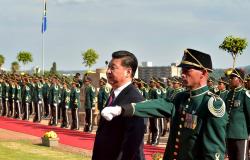
China has been committed to creating an ‘all weather’ relationship with Africa particularly since the new century by persistently expanding its economic, political and, more recently, security involvement in Africa. China's intensified peacekeeping efforts in Africa reveals not only China's desire for maintaining the regional peace and stability for its economic cooperation and trade with Africa, but also China's strategic intention of creating its own sphere of influence in the forms of Sino‐African ‘Community of Common Destiny’. In so doing, China wishes to cement its relations with Africa that it identifies, together with those with other developing nations, as the ‘basis of China's international relations’ and provide itself with a safe access to African markets, resources and investment destinations in order to sustain its economic growth that bases its long cherished dream of restoring its past glory of ‘Fuqiang’ (wealth and power) and rise in the global power hierarchy.
Policy Implications
- Chinese foreign policy makers should be aware that China's interest could be better protected if its peacekeeping and peacebuilding activities in Africa could be conducted in line with the principles of advancing democratization, ‘good governance’ and human rights protection.
- Chinese decision‐makers should be aware that it is in China's interest to conduct peacekeeping and peacebuilding operations in Africa under the auspices of the UN despite its growing capability of intervening African affairs militarily.
- Foreign policy makers in Africa and elsewhere should be aware that China's involvement in Africa's peacekeeping and peacebuilding is a mixed blessing: on the one hand, it may reinforce Africa's peace and stability; on the other hand, it may reinforce authoritarian regimes and undermine Africa's democratization.
- Foreign policy makers in Africa and elsewhere should watch closely China's security presence in Africa in the hopes of incorporating it into international efforts in pushing for peacekeeping and peacebuilding as well as for Africa's democratization and ‘good governance’.